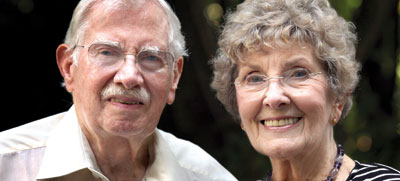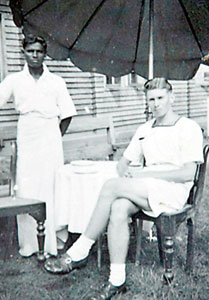‘Except for the beer I have wonderful memories’
View(s):Visiting Sri Lanka on a programme which has allowed WWII veterans in Wales to return to the places they served, George Davies, recalls his posting here
By Smriti Daniel
The silver badge in his palm is one of George Davies’ most prized possessions. He keeps it gleaming – embedded upon the little shield is a sinking shark, speared by a marline spike. In the background, a fishing net traps two enemy mines.
Designed to honour the service of minesweepers during WWII, the badge was called for by no less than the First Lord of the Admiralty, Winston Churchill himself. For George, a spry 87-year-old Welsh WWII veteran, the shield brings backs memories of sweeping for mines in the North Sea and off the French Coast, of nights spent sleeping on the mess decks of the HMS Glengyle as it made its way to India and of Sri Lanka, then Ceylon, –the island he and Barbara, his wife of 60 years, wanted to visit one last time.

Happy to be here: George and Barbara. Pic by M.A. Pushpakumara
An 18-year-old George was just beginning a career in banking when he was called up for war duty in 1943. He was first enlisted in the RAF. “I did my square bashing in Cardington before being drafted to Blackpool for my Wireless Operator’s course,” he says, explaining that he was abruptly transferred to the Navy when the latter realised they didn’t have enough telegraphists to man all the landing craft they would need for the second front. “As soon as you passed 12 words a minute in Morse Code, you were automatically transferred to the Royal Navy.” (George would soon be able to muster 28 words a minute.)
His first serious posting was aboard the HMT Cranefly, a fishing trawler that had been converted for mine sweeping duties in the North Sea. The Cranefly carried out her duties alongside three other ships – travelling one behind the other, they would sweep for mines by day and patrol by night, ensuring that the shipping lanes were clean before the convoys came through. Part of the crew consisted of a group of fishermen – “a hardy lot who didn’t take very well to Naval discipline” George remembers and superstitious too. “You didn’t shave at sea and you would never have an open safety pin on the Mess Deck.”
Following VE Day in May 1945 and the announcement of a decisive victory in Europe, George was discharged and sent to a transit camp in Colombo, via Bombay. Their focus, they were told, would be on the war in the Pacific and combating the threat from the Japanese Imperial Navy. Conditions were arduous on the journey, but George was less than pleased to arrive in a village off Bombay just in time to experience his first monsoon. In a letter written to his parents at that time he marvels at sarees (“their dress is very amazing and it all seems to be one piece of cloth wrapped around their bodies”) and complains about the conditions of their camp (“I have seen horses live in better quarters.”) He also makes mention of a world changing event – the dropping of the atom bombs on Hiroshima and Nagasaki.

More than half a century ago: George in Ceylon during WWII
Today, George confesses they had no clue of the savage ferocity of the bomb and the devastation it wrecked. For them, it simply meant the end of the war. “There was a great sense of relief. We were still on the ship when the first bomb was dropped. We heard it on the radio,” he says. “We discovered later that we were coming out for the landing on Singapore and if that had happened we would have had tremendous casualties, so yes, we were relieved.”
From Bombay it was on to a transit camp in Ceylon. Though uncertain of exactly where they were, George remembers coming to Mount Lavinia to swim and to Colombo for the SWOC Club near Town Hall – a great favourite on account of their cold beers. “I have wonderful memories of Ceylon even though we didn’t see a great deal of it at that time.” George and his compatriots were housed in a large camp, ringed by a ditch and barbed wire.
“We were confined inside the camp, but we could hear a lot of music from the village when they had their special festivals,” he says, “something to do with the moon. We couldn’t see them but it was lovely to hear it.” He remembers eating pineapples and watching films in the open air cinema. The one great disappointment was the beer. “In the canteen the beer was reconstituted beer – powdered beer that came from Scotland and they added this boiled water to it.” It never tasted quite right. When on break, the soldiers would be allowed to travel to leave camps in either Nuwara Eliya or Kandy. George chose the former.
George would remain here until he was drafted on duty aboard another minesweeper, this time working the inshore minefields between Boulogne and Dieppe off the French coast. After he was demobbed, George returned home to Wales to find that his family and friends had survived the war for most part unharmed. “We were very lucky,” he says. Within the next decade, he would meet Barbara in his dentist’s office and after a determined courtship would win her hand. Though he was lucky to have a job waiting for him, George says times were tough in those early years. “There were still war conditions,” he says, “It continued back home for years and years. When we went on our honeymoon we still had to take our ration box with us.” The couple celebrated their 60th wedding anniversary in September last year.
George and Barbara’s visit to Sri Lanka was made possible by the Big Lottery Fund’s Heroes Return 2 programme, one which has allowed an estimated 830 veterans, widows, and spouses in Wales to return to the places they had served in during the war.
Follow @timesonlinelk
comments powered by Disqus

















